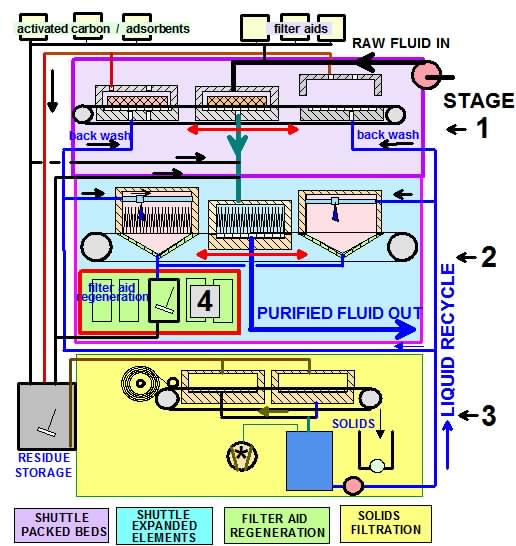AIR/GAS PURIFICATION
In an analogous situation to environmental WATER the continuing consumption of environmental AIR is accompanied by its continued contamination.
As with water this contamination is primarily caused by human activity and as with water the dangers posed can only be eliminated by a change in human behaviour.
It is becoming inevitable that both fluid mediums of the environment after consumption and contamination must be purified and reused on a broad basis.
Crucially however in both cases contemporary purification technology is not up to the task of providing an economical methodology for achieving this.
The chart on the right shows that the heating of buildings in the northern hemisphere is responsible for the major part of domestic energy consumption. Also depicted is an approximation of the large savings in energy that can be achieved by improved insulation and internal air purification by means of total recycling of air within all types of buildings.
The innovative technology to be presented here points to the possibility of at least a 25% reduction in the present domestic energy consumption in European countries.
(The accompanying infra-red photograph of the external surfaces of a typical building gives a convincing verification of heat losses from a typical building.)
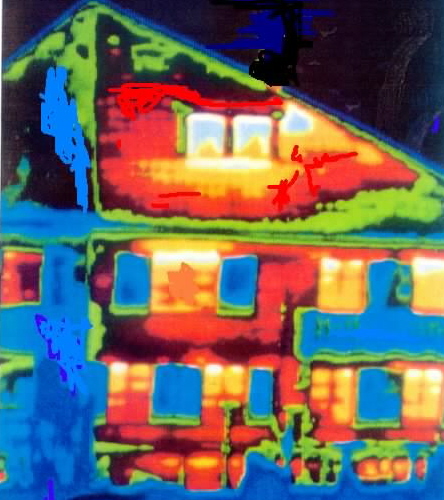
WHAT DEGREE OF AIR PURIFICATION WOULD BE REQUIRED?
This would be similar to that already being achieved in manned space flights for astronauts. A high priority requirement is the complete removal of all micro-organisms and noxious gases from used air.
Packed elements commonly installed in ducting systems of air conditioning plants could provide high quality filtered air. However an increasing quality demand is offset by a shorter stand time with the requirement of manual intervention for replacing the elements whereby the used elements can seldom if ever be regenerated and reused.
The use of packed elements is restricted to such applications as surgical spaces in hospitals and working areas in the electronic industries.
Conventional packed elements are unsuited for the demands of total recycling of sterile air in building spaces.

Expanded Surface Cartridge Filter![]()
PLEATED MEMBRANE CARTRIDGE
Cartridge filters fitted with pleated membrane elements are the most widely used designs for achieving “absolute” purification of fluids in industries such as the pharmaceutical industry.
Their employment in air conditioning plants is not commonplace.
The reason is the high initial and renewal cost and the manual operation associated with these designs.
Cartridge filters fitted with annular packed or wound beds are widely used for general application in a variety of gas filtration applications.
They are generally not suitable for “absolute” filtration and media regeneration.

PACKED and WOUND CARTRIDGE
REGENERABLE FABRIC FILTERS

Back-flushing candle filters find application in large industrial processes in specialist applications ranging from macro-filtration with recovery of the filtered solids to removal of toxic gases in a pre-coating mode of operation.
However the use of membranous media to provide “absolute” filtration is not a practicable proposition.
All the above depicted and described state-of-the-art apparatus are unsuited for the total re-circulation and purification of air for breathing purposes in buildings and factories.
MORE: “FAILURE STATE-OF-THE-ART - WHY?”
- They must be capable of removing all pathogenic micro-organisms, extraneous odours as well as molecular species of a noxious nature.
- They must be capable of controlling the temperature, humidity and concentration of extraneous gases in the circulated air.
- All media used in the purification SYSTEM must be susceptible to fully automatic regeneration and reuse.
- The apparatus must be capable of round-the-clock fully automatic operation without supervision.
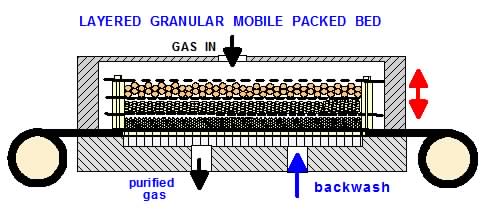
Analogous to liquid purification layered packed beds of graded granular material can be used for PRIMARY or SINGLE STAGE purification of all types of gases. SINGLE STAGE plants ensuring particulate removal in the size-range 1 - 500 microns are especially suited for many industrial environments.
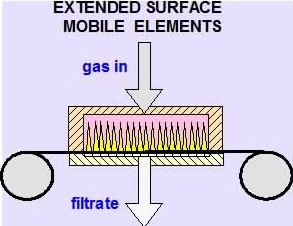
Analogous to liquid purification, SINGLE units with EXTENDED SURFACE ELEMENTS are ideal for particulate removal in the size range
0.001 - 0.1 micron for air and gas purification in large industrial, business and institutional environments.
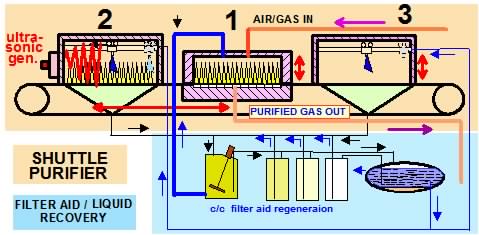
OPERATION
Section 1 is reserved for filtration with or without pre-coating filter aid.
Sections 2 and 3 are used alternatively for the purpose of media regeneration with high pressure fluid jets and/or ultra-sonic generators.
THE MILLER UNIVERSAL SYSTEM FOR
LARGE SCALE GAS PURIFICATION REQUIREMENTS
Fully automatic round-the-clock
- Centralized TOTAL re-circulated sterile air conditioning
- Sterilization and absolute filtration of industrial air and gases
- Industrial off-gas purification
Comprising individual innovative liquid purification stages:
- Mobile size-graded layered packed beds
- Mobile expanded surface elements
- Residue filter with fluid recycling
- Filter aid regeneration and reuse
STATE-of-the-ART
WHY HAVE CONVENTIONAL APPARATUS FAILED TO SOLVE THE PROBLEMS ASSOCIATED WITH LARGE SCALE AIR PURIFICATION?
The answer is straightforward and simple:
The application of such apparatus as depicted below cannot achieve cost effective sterile filtration and media regeneration. Fitted with either membranous or tightly packed beds of suitable bulk materials they are wholly unsuited for media regeneration and reuse on a large scale.
The extended surface pleat-like arrangement consists of membranous and monofilament woven textile materials as integral sections of the filter belt.
SHUTTLE EXTENDED SURFACE SYSTEM
Contents of this chapter:
- OVERVIEW - ENVIRONMENTAL AIR / PROBLEMS
- STATE-of-the-ART / WHY HAVE CONVENTIONAL APPARATUS FAILED TO SOLVE THE PROBLEMS ASSOCIATED WITH LARGE SCALE AIR PURIFICATION?
- WHAT IS REQUIRED OF APPARATUS TO ACHIEVE THE PRESCRIBED GOAL?
- MOBILE PACKED BEDS
- MOBILE EXTENDED SURFACE ELEMENTS
- THE MILLER UNIVERSAL SYSTEM FOR LARGE SCALE GAS PURIFICATION REQUIREMENTS
- APPLICATIONS
- Large thermal energy savings
Increasingly much of the external air in metropolitan areas used for air renewal in buildings consumes a large part of the present heating requirements of all types of buildings. Total recirculation and purification would exclude the need for external air and cut heating/cooling costs considerably. - Improved health of all people now confined in spaces containing polluted air
To-days burgeoning motor traffic density despite legislative restrictions causes serious external air pollution. This external air is transferred to the internals of buildings as “renewal” air.
Added to this is the pathogenic pollution caused by micro-organisms from people occupying these spaces. Little if any of this contamination is removed by contemporary air conditioning plants. Published assessments claim that at least a 20% reduction in NHS (health) costs would accrue from the complete avoidance RENEWAL AIR and removal of pathogenic pollution in enclosed spaces including all hospitals.
THE CASE FOR AIR PURIFICATION WITHIN BUILDINGS
- MOBILE PACKED BEDS
- MOBILE EXTENDED SURFACE ELEMENTS
The key innovative apparatus to achieve the above requirements are
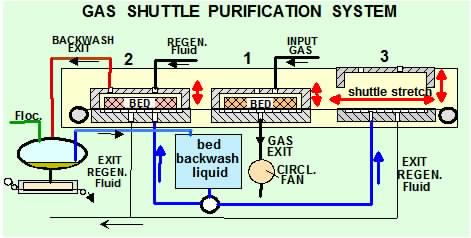
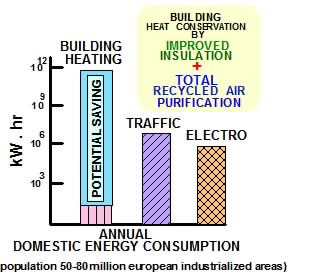
|
Ref: Figure “MILLER UNIVERSAL SYSTEM” |
||
|
AIR CONDITIONING (stages 1a, 1b, 2, 3, 4) |
||
|
STAGE 1a |
PARTICULATE REMOVAL |
|
|
STAGE 1b |
VAPOURS, GAS REMOVAL |
|
|
STAGE 2 |
STAGE 4 |
STERILE PURIFICATION |
|
STAGE 3 |
RESIDUE RECOVERY |
|
The sterile filtration, conditioning and complete recycling of air in buildings with concomitant improvement in their insulation offers an ideal method for achieving large reductions in the consumption of fossil fuels and the emission of green house gases.
The MILLER UNIVERSAL SYSTEM offers what is perhaps a unique solution for achieving this.
|
Ref: Figure “MILLER UNIVERSAL SYSTEM” |
|
|
INDUSTRIAL OFF (stack) GAS |
|
|
STAGE 1a |
PARTICULATE REMOVAL |
|
STAGE 1b |
EXTRANEOUS GAS REMOVAL |
On a global scale industrial stack off-gases are a continuing source of environmental pollution. The elimination of these stacks should be a prime objective.
Particulate matter, noxious gases and vapours from such sources as power stations and industrial furnaces can be removed by MILLER UNIVERSAL SYSTEMS leaving purified CO2 for disposal.
Regenerative heat recovery presents an added incentive!
|
Ref: Figure “MILLER UNIVERSAL SYSTEM” |
||
|
INDUSTRIAL GAS PROCESSING |
||
|
STAGE 1a |
PARTICULATE REMOVAL |
|
|
STAGE 2 |
STAGE 4 |
NANO-MICRO PARTICULATE REMOVAL |
|
STAGE 1b |
GAS CONVERSION |
|
|
STAGE 3 |
RESIDUE FILTRATION |
|
Industrial gas processing involving
- electrostatic purification,
- catalytic transformation,
- purification by contact with activated carbon,
- drying with silica gel, etc.
can be carried out with the MILLER UNIVERSAL SYSTEM
MILLER UNIVERSAL SYSTEM